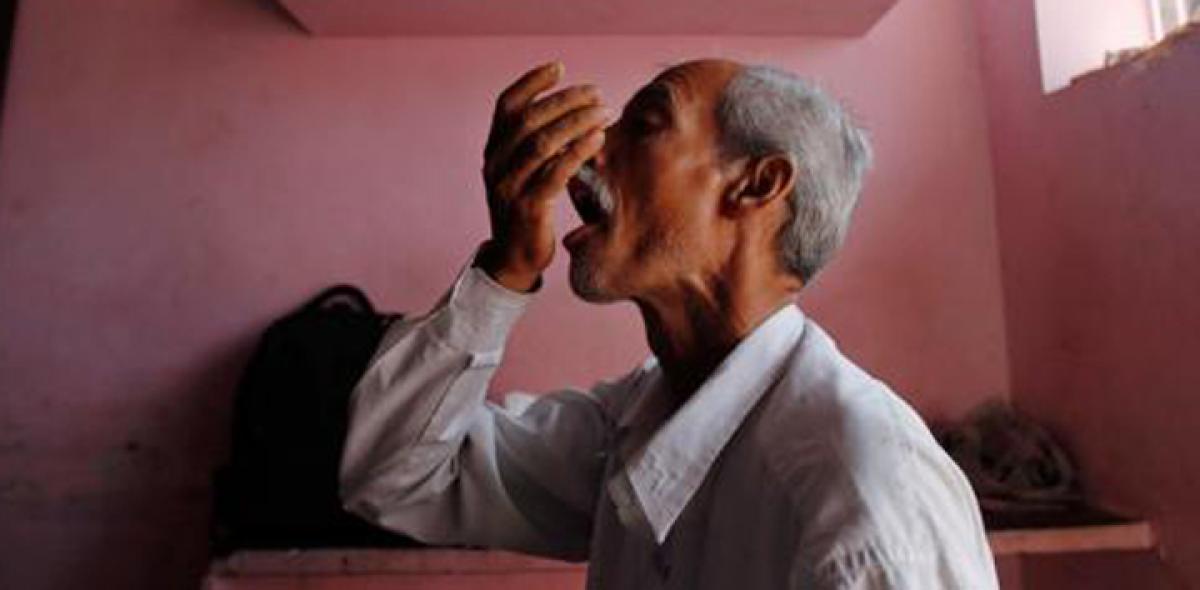Live
- Transforming education for the workforce of tomorrow
- Despite global odds, GDP growth at 6-7% good for India
- IIFL Home Fin to raise Rs 500 cr
- Sensex, Nifty drift lower on profit booking
- Jagan treated cadres as ‘subordinates’, alleges Grandhi
- Mpower’s survey on edu loans
- IIP growth falls to 3.5% in Oct
- Easing food prices lower retail inflation to 5.48% in November
- Space allocation for packaging units at MSME parks on anvil
- Maha Kumbh: Yogi reviews preparations
Just In

India is home to 194.6 million undernourished people in the world and at the same time, 2.6 million Tuberculosis (TB) cases are reported every year with 1,000 TB-related deaths happen every day in India. This figure shows that poverty is found to be the common denominator between protein energy malnutrition and tuberculosis.
There are evidences which show that a TB patient has better cure rate with a better diet; malnourished TB patients show slow recovery and have higher mortality rates as compared to well-nourished patients
India is home to 194.6 million undernourished people in the world and at the same time, 2.6 million Tuberculosis (TB) cases are reported every year with 1,000 TB-related deaths happen every day in India. This figure shows that poverty is found to be the common denominator between protein energy malnutrition and tuberculosis.
As per World Health Organisation (WHO) norms, a TB patient requires about 2,000 calories a day and our normal food will contribute about 900 calories, so there is a need of another minimum 1,100 calories to help TB patient target the disease.
This is why, patients with tuberculosis, who are given nutritional support, should in principle receive treatment for both macronutrient and micronutrient deficiencies. Access to a calorifically adequate and nutritionally balanced diet can address both these issues.
Although, there are few programmes to support nutrition to TB patient at state level; no national consensus on whether government should support nutritional support to TB patients at a macro scale is worked out. Questions arise as to who should provide this support to TB patients, whether all TB patients should be provided this support or only Multi Drug Resistant (MDR) TB patients; what will be the approach to come up with such programme; whether this support should be provided through existing ration card holders linking the beneficiaries with public distribution system (PDS) or transfer the amount to the patient bank account through cash transfer scheme.
The question is if government comes up with a plan to provide nutritional support to all the TB patients, is it necessary to link patients with any of the existing social welfare government schemes or come up with anew schemes exclusively for TB patients. There are many such unanswered questions government needs to deliberate further and finalize soon.
How should the government proceed on this situation? Looking at the complex problem of malnutrition and its linkages with poverty, there is little choice left before it but to ensure that the patient gets nutritional supplement. There are evidences which show that a TB patient has better cure rate with a better diet; malnourished TB patients show slow recovery and have higher mortality rates as compared to well-nourished patients.
So, government and national TB control programmes in India should make a note of the fact that without having better nutrition, we are unlikely to end TB in the country. The India Human Development Report of the previous government plan panel had cautioned the Central and State governments regarding the decline in the per capita intake of calories as well as proteins in India due to the poor purchasing power of people to afford high protein-led foods at home on regular basis.
Looking at the rocketing prices of pulse and other protein-rich food items in the country, it is unlikely that poor people can afford such food at home. There is research by public health and nutrition experts, which confirms that if the government provides adequate nutritional food, almost half of the present TB cases can be prevented.
The government should prepare both long and short-term plan to address this issue of nutrition among the TB patients in India. In the short term, it should allocate required funds to provide nutritional support to the TB patients, and, in the long term, it is necessary to include all the malnourished people under a government-incentivised programme to prevent this disease among the poor people including the speedy implementation of food security act. (The author is a public health analyst and may be contacted at [email protected])

© 2024 Hyderabad Media House Limited/The Hans India. All rights reserved. Powered by hocalwire.com







